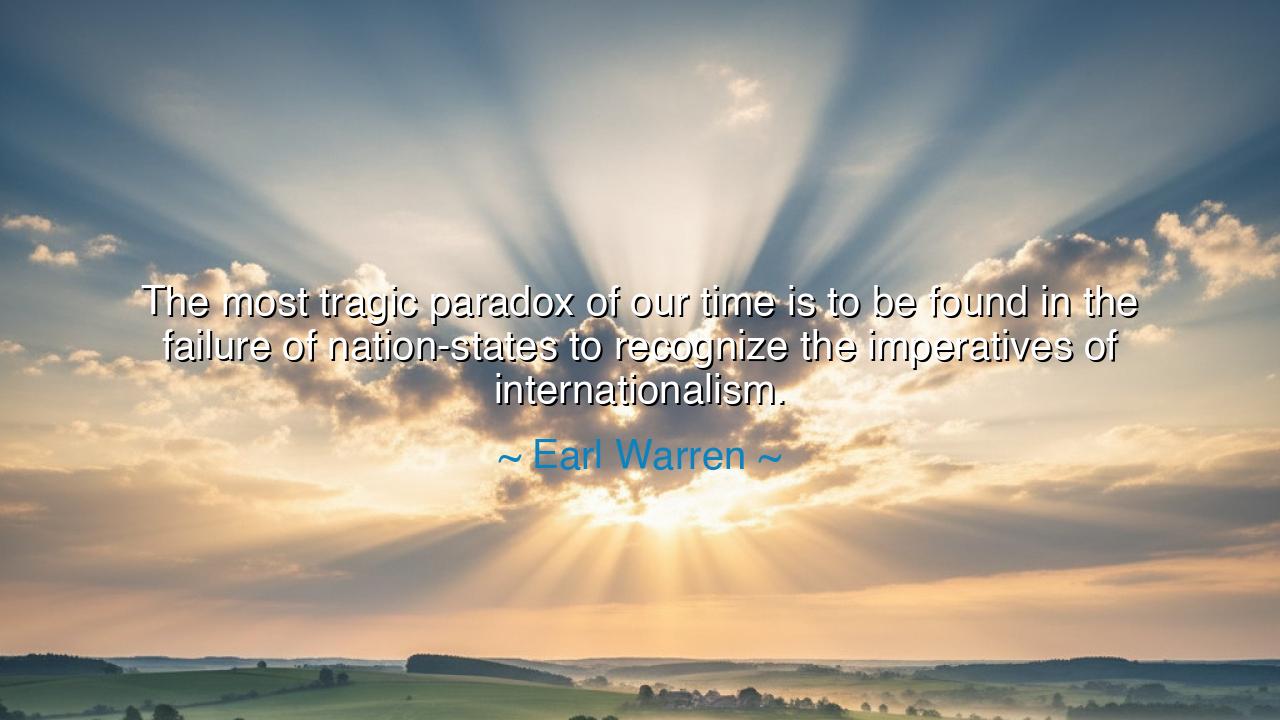
The most tragic paradox of our time is to be found in the failure
The most tragic paradox of our time is to be found in the failure of nation-states to recognize the imperatives of internationalism.






Opening Scene
The room is dimly lit by the soft glow of a desk lamp, casting a warm yet reflective atmosphere. The world outside is quiet, the hum of the city fading into the background as evening falls. Jack sits at the table, a book open in front of him but his gaze is distant, clearly lost in thought. Jeeny stands by the window, her arms crossed as she looks out over the city below, her posture thoughtful. The stillness of the room feels almost heavy, as if something deeper is waiting to be explored.
Host: After a few moments, Jeeny turns from the window, her voice quiet but filled with contemplation.
Jeeny: “I came across a quote by Earl Warren recently that really made me think. He said, ‘The most tragic paradox of our time is to be found in the failure of nation-states to recognize the imperatives of internationalism.’ It’s such a powerful statement, isn’t it? It made me wonder — why do so many nations struggle to see the importance of cooperation beyond their own borders? Why does it often feel like national interests trump global needs?”
Jack: “That’s a really striking thought. I think it’s because nation-states have become so focused on their own survival and prosperity that they forget the interconnectedness of the world. We live in a time where issues like climate change, global health, and economic inequality don’t stop at national borders. Yet, too often, countries focus on their own interests rather than on finding solutions that can help everyone.”
Jeeny: “Exactly. It’s almost like there’s this tendency to see the world in terms of competition, rather than cooperation. Every nation seems to be fighting for what’s best for themselves, and we forget that the health of one nation is so deeply tied to the health of others. We’ve seen it with the pandemic, for example — a global crisis that no single nation could solve on its own. But there’s still this reluctance to approach global issues with the mindset of collective responsibility.”
Jack: “It’s a paradox, like Warren said. The idea that nations are stuck in this cycle of self-interest even when the world is crying out for collective action. The failure to recognize the importance of internationalism leaves us vulnerable to crises that we can’t solve alone. It’s like a puzzle where every piece needs to fit together, but some pieces just keep pushing away from each other.”
Host: The conversation deepens, the weight of Warren’s words settling between them. Jack places the book aside, his expression thoughtful as he reflects on the broader implications. Jeeny moves closer to the table, her voice steady as she continues.
Jeeny: “I think what’s so tragic is that when we fail to cooperate on a global scale, we’re not just hurting ourselves — we’re hurting everyone. There’s so much potential for progress, but it’s stunted by the idea that we can only solve problems within the boundaries of one nation, one culture. We’re living in an era of globalization, but we’re still clinging to old ideas of sovereignty and isolationism.”
Jack: “That’s exactly it. We’re more connected than ever before, but we continue to operate as though the world is divided into separate pieces. We see the same problems across the globe, and yet instead of working together, it often feels like each country is dealing with things in isolation. It’s like we’re all trying to solve the same puzzle but fighting over whose piece fits where.”
Jeeny: “And it’s so clear that the world has changed. Issues like climate change, refugee crises, and pandemics affect us all. The failure to recognize the need for international cooperation is almost like trying to put out a fire with one bucket of water when there’s an entire ocean of resources we could tap into if we just worked together.”
Jack: “It’s frustrating because we know the world has the capacity to solve these problems, but only if we recognize that we’re all in this together. The solutions aren’t going to come from isolation — they’re going to come from international collaboration, from countries setting aside their differences for the greater good.”
Host: The air in the room feels charged now, the weight of their conversation hanging between them. The world outside continues its rhythm, but inside, Jack and Jeeny have come to a realization: the failure of nation-states to embrace internationalism is a tragedy not only for those countries but for the entire planet. It’s not just a political failure — it’s a failure of vision, of recognizing that global problems require global solutions.
Jeeny: “Maybe the lesson here is that we can’t afford to be so caught up in our own corners of the world anymore. The future depends on finding ways to work together, to think beyond borders, and to collectively address the challenges we all face.”
Jack: “Yes, it’s about building bridges instead of walls. The issues we’re dealing with today aren’t confined to one nation, and we won’t solve them by looking inward. We need internationalism, we need collaboration — we need a shared commitment to the well-being of everyone, everywhere.”
Host: The conversation fades into a quiet understanding. The world continues its rhythm, but inside, Jack and Jeeny share the realization that the path forward requires embracing global cooperation — not just for the benefit of any one nation, but for the collective well-being of all. The future, they understand, depends on recognizing that we are all connected, and together, we can solve the problems that no single nation can face alone.






AAdministratorAdministrator
Welcome, honored guests. Please leave a comment, we will respond soon